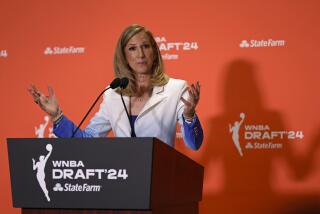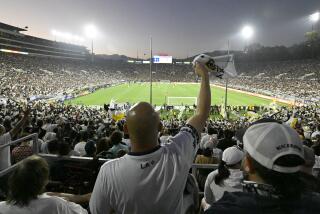Predators Face Competition in Nashville
- Share via
NASHVILLE, Tenn. — The Nashville Predators’ front office might be facing tougher competition than what the expansion team’s players will see this season.
The team is trying to draw crowds in an area devoted to country music and NASCAR racing, while the city government is selling personal seat licenses to help pay for a $292 million stadium for National Football League Oilers.
With the arrival of the NFL and the Predators this year, people in the nation’s 24th largest city are being asked to buy almost 14,000 club seats and 220 luxury suites in the new stadium and Nashville Arena for 10 football games and 41 hockey games a season.
“Obviously, we all want to believe that Nashville has the ability to support two pro sports teams,” said Cliff Hawks, executive director of the local sports authority whose job it is to market, package and sell the personal seat licenses which football fans must purchase just for the right to buy season tickets.
As of late September, 45,250 of an anticipated 57,000 seat licenses in the new 67,000-seat stadium have been sold at a range of $250 to $4,500 each, tickets not included.
The Predators, with 40 percent of their tickets priced at $30 or less, had sold more than 12,000 season seats in the new 17,250-seat arena. Jack Diller, the team president, said there would be a sales blitz before the season opens Saturday against Florida. Diller said that while only a few of the 76 suites were vacant, the team was having more difficulty selling the 2,000 club seats.
The NHL told the Predators they had to sell 12,000 season seats to win the franchise, just like expansion teams in Atlanta; St. Paul, Minnesota; and Columbus, Ohio, that will start by the 2000-2001 season.
Like Nashville, each of those cities had to offer a new arena to get a franchise. The $130 million downtown Nashville Arena, paid for by public money and crafted as a music venue, opened in December, and has yet to become a focal point for the community of about 530,000 people.
“It’s not like New York where people are used to going to Madison Square Garden,” Diller said. “People occasionally come to the arena, but it’s certainly not a major fabric of business life.”
Diller knows he has longer odds than the Oilers. Twenty local businesses guaranteed the sale of football seat licenses as part of the agreement to draw the team from Houston. That guarantee will kick in if the community hasn’t purchased another 11,750 licenses by June.
The Predators, who paid an $80 million fee to the NHL for the franchise, have no such cushion. They are selling tickets to a 10-county metropolitan area of 1.1 million people at their own expense.
“It’s fair to say that there’s been some money spent on the Oilers that otherwise would have been spent on us,” Diller said. “It stands to reason that with the kind of campaign that’s been put on--and it hasn’t been financed by the Oilers--it makes our job more difficult.”
The Predators also may discover that there isn’t enough money or people in the region to buy all of their tickets. The population and business base is small and slowly growing. In 1990, Nashville was the 25th largest city in the country. Six years later, it had moved up just one spot. The metropolitan area is the 40th largest in the U.S.
According to the U.S. Census Bureau, the average per-capita income in Davidson County, which includes Nashville, is $23,655, below the U.S. average of $24,231.
As a media market, Nielsen Media Research lists Nashville as 33rd in the nation. In the NHL, only the Carolina Hurricanes’ and Buffalo Sabres’ markets are smaller. The larger the media market, the more the local club usually can expect to generate from television and radio packages.
The Predators decided to buy their own television time, and thus own the right to sell the advertising package themselves. By late December, when the Oilers’ season ends, the Predators hope to have begun captivating the public.
“They like football and NASCAR here. Football because of the physical play. NASCAR because of the speed,” said Barry Trotz, the team’s rookie coach. “We bring both of those elements to our games.”
Trotz hopes the Predators can compete for attention with the Oilers for another reason. “We came to Nashville because we wanted to be in Nashville, not because it’s a better place than where we were before,” he said.
Diller, a former executive at Madison Square Garden and in San Antonio with the National Basketball Association Spurs, is optimistic that by controlling expenses, the new franchise could turn a profit this season in a league that is driven by ticket revenue.
“We believe we have the opportunity to build a good business here, but it’s not going to happen on Day One,” Diller said. “The potential is there. One of the biggest advantages we have is this building. It’s a fantastic building.”
It remains to be seen, though, whether the arena will become the place to go. The Predators are trying to sell a faceless on-ice product with no stars to an area where most fans will have to learn about hockey. General Manager David Exile said the player payroll probably will top out at $20 million, about a third of Stanley Cup champion Detroit’s last season.
“We have to sell the game of hockey whether it’s Eric Lindros or Joe Smith,” he said. “We’ve got to sell the NHL as a quality product.”
More to Read
Go beyond the scoreboard
Get the latest on L.A.'s teams in the daily Sports Report newsletter.
You may occasionally receive promotional content from the Los Angeles Times.






